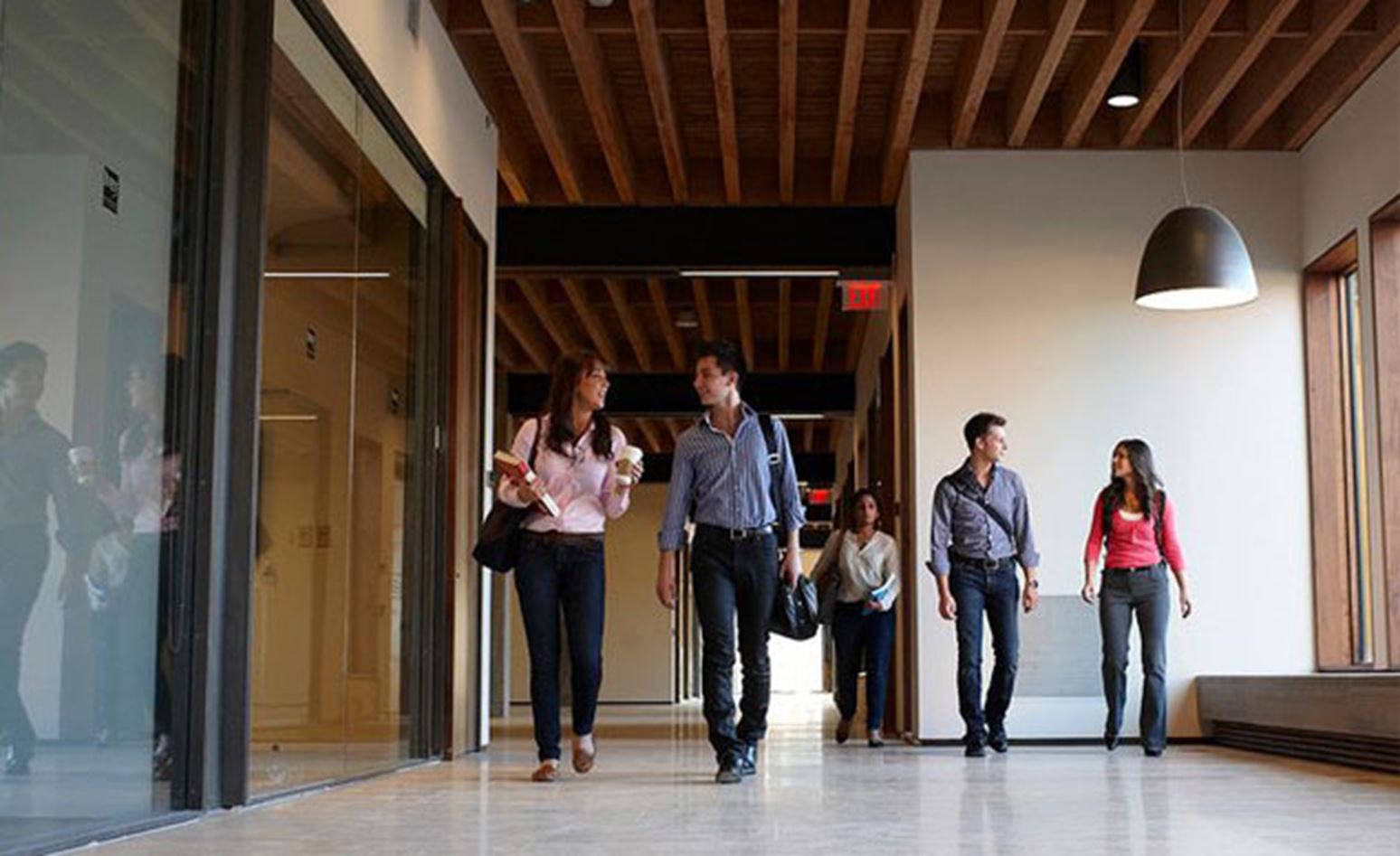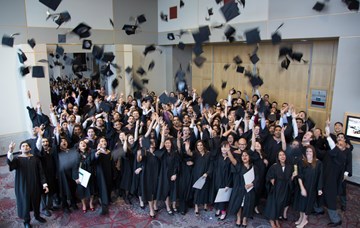From a purely economic view, a one-year MBA program make sense – and cents. Getting an MBA in half the time brings considerable savings in tuition and fees and reduces lost wages and time out of the workforce.
The rigorous and focused format also saves time, allowing students to advance their careers faster and with less impact on other areas.
Whether they were looking to fast track their careers quickly or had family responsibilities or jobs awaiting them, recent Ivey MBA graduates share why the one-year format was a fit for them.
Related to this story
Tristan Hodge, MBA ’14 – The quick switch
With five years’ experience as an investment advisor and commodity trader in Vancouver, Tristan Hodge was looking to break into the investment banking market in Toronto. He wanted to do an MBA to build on his skills and professional network. Ivey’s one-year format was a draw because he didn’t want to be out of the workforce for too long. The intensity of the program also appealed to him, especially since the one-year format still provided almost the same amount of classroom hours as a two-year program.
“I didn’t feel I would be missing a lot in terms of class time or exposure to professors and I prefer to be highly engaged over a short period instead of dragging it out twice as long,” he said.
The Case-Method Learning approach to teaching, proximity to Toronto, and alumni network were also factors in his decision to attend Ivey. From speaking to Ivey alumni beforehand, he was expecting an immersion program experience with a close-knit group of classmates that would lead to some great friendships and contacts. His experience with the Ivey MBA proved that to be true.
“By the end of the year, I had everything I needed. There was plenty of time to make connections and I found a really good group of people that I’m happy to keep in touch with going forward,” he said.
He also succeeded in meeting his career goals and is now an Associate with Scotiabank’s Investment Banking Diversified Industries Group in Toronto.
“I met my goals 100 per cent. I got a job in the industry I wanted and the whole thing worked for me,” he said.
Hodge credits Ivey’s Career Management team for providing support and resources that helped him to achieve his career goals.
“Career Management was fantastic. The team starts early in providing support, is realistic, and sticks with it. It was easy to build a relationship with the team members and I think they genuinely did care about us,” he said.
However, Hodge advises anyone considering a one-year MBA program to be ready to do more course preparation and to have goals for the MBA.
“It’s an intense year and there isn’t time to do soul-searching. You definitely do figure out some things about yourself in the process, but it’s not the place to go just to figure things out,” he said. “People need to be focused and know what they want.”
Sophia Zhao, MBA ’14 – Family matters
When Sophia Zhao was researching MBA schools, a one-year format was not a rigid criterion. But because her family was going to stay behind in China, a one-year program was appealing. That, combined with Ivey’s Case-Method Learning approach, led her to choose the Ivey MBA.
“Ivey’s Case-Method Learning increased the advantages of the one-year program. It’s a very practical approach that maximizes the learning in that shorter period of time. Those two features combined made the program beneficial to me,” she said.
With six years’ experience working at Proctor & Gamble in China, accumulating new knowledge wasn’t Zhao’s only goal. She also used the MBA to transfer what she had already learned through her past experience to a new career.
“The more work experience you have, the more benefit you get from the program because a lot of things are transferable. Knowledge is not the biggest and most valuable part of the MBA because nowadays we have so many sources of knowledge,” she said. “The MBA also gives you a chance to reflect. That’s why now, when I think back on the MBA, I would say one year was the perfect amount of time to give me a chance to learn and to reflect.”
However, Zhao said the one-year MBA is more intensive and requires students to be well-prepared. And if you have a family, your family members need to be aligned with your goals.
“The one-year program requires better engagement. If you want to get the most out of the program, you need to set priorities,” she said.
Zhao’s priorities included gaining international business experience and switching industries. She achieved her goals.
Following her MBA, Zhao was accepted into Johnson & Johnson’s International Recruitment & Development Program and is now District Sales Manager of Johnson & Johnson’s medical devices branch in China.
“I didn’t have any background in health care so without the MBA, the company might not have invested in me,” she said.
Not only did the MBA help her to learn new information for switching industries, it also taught her to think big picture and consider the strategy – a mindset that she now applies in her day-to-day work at Johnson & Johnson.
Sergio Gomes, MBA ’14 – Work awaits
When Sergio Gomes was comparing MBA schools, the alumni, curriculum, and brand were important factors. And although he was already considering Ivey for those aspects, the one-year format cemented the deal. Gomes took a leave of absence from his job at BMO Financial Group to pursue an MBA so he was eager to return to work as soon as possible.
“I didn’t want to give up a lot of the momentum I had in my career. I felt I had a really good start and could see a lot of opportunity ahead. Stepping away for two years would have put me in a different place,” he said. “I found I was away long enough to accomplish a lot of the goals that I wanted out of my MBA, but not so long that the people and the work had changed dramatically. There was a bit of a learning curve upon my return, but I was able to get back to it and be effective right away.”
Gomes said one year was also the right amount of time to unplug and reflect on his career so that he could return to work revitalized.
“Doing my MBA was also about taking a break from my busy work life to think about what I needed to accomplish in order to have a successful leadership career. Going away and really going in-depth and doing it in the classroom full time encouraged me to think differently,” he said. “I wanted to gain a good understanding of my strengths and developmental priorities. As a result of the program, I gained a clear picture of how I have been successful and what I am good at, as well as the things I need to work on.”
Gomes was able to take advantage of Ivey’s Leave of Absence Program, which offers coaching on ways to manage the corporate leave process as well as a financial incentive upon completion of the program to help cut the costs of tuition.
Thanks to advice from Ivey’s Career Management team, he stayed in touch with his employer and was informed of what was going on with the company. He was also open with his employer about his decision to participate in recruitment sessions involving other companies.
“The advice I received from Career Management was spot-on. I was told to share everything with my employer because the business network in Canada is so small,” he said. “I went through the process of due diligence on my career. I was able to assess my market value and I ultimately discovered that BMO was really the right place for me. I felt a lot more ownership in my choice to come back.”
Gomes said he has received positive feedback since returning to work and he has also been given more opportunities. He was also able to leverage his MBA to become promoted (eight months after the program) to his current role of Director, Enterprise Strategy. He was previously Senior Manager.
“The expectations and opportunities have been commensurate with the fact that I have an MBA now,” he said. “I think that I have more leadership ability now and I think that’s based on the fact that I was able to have a break to think about things and think about them in a way that I could not have done at work.”



